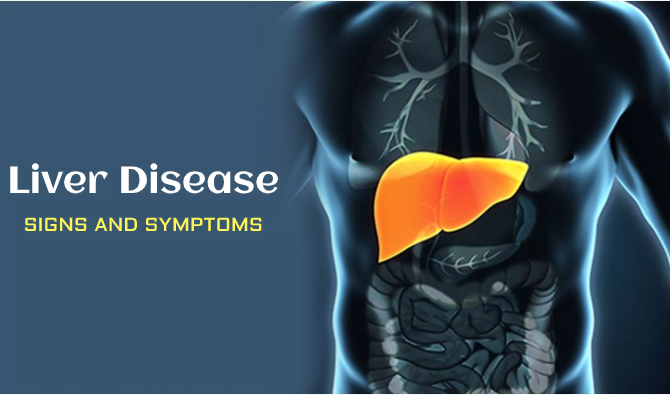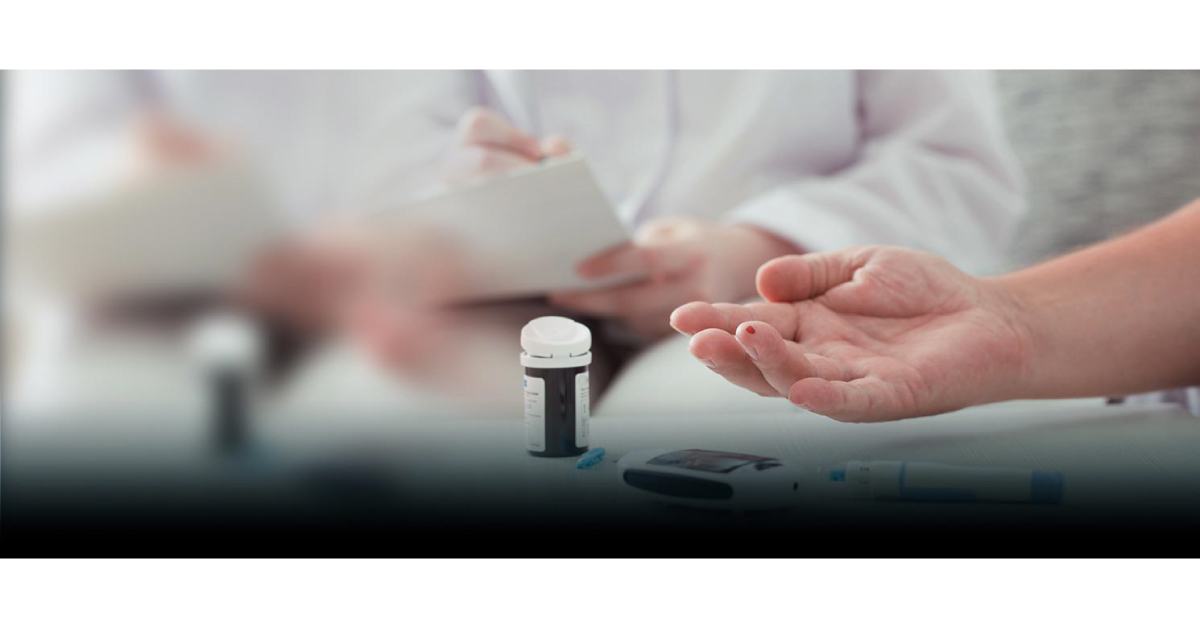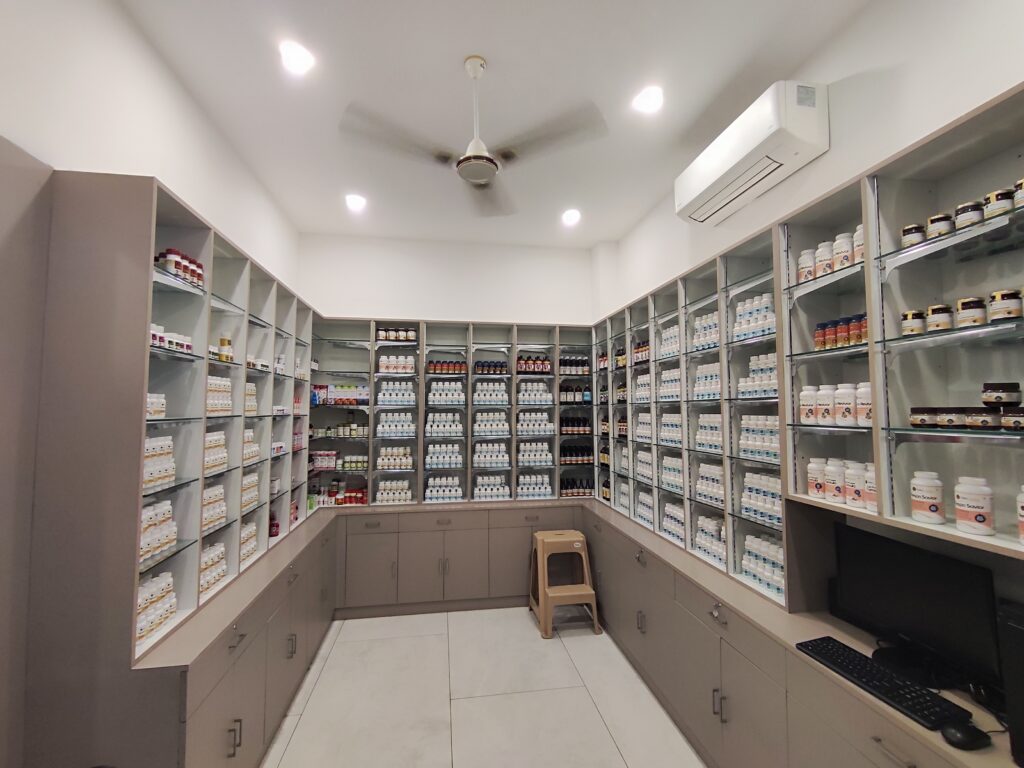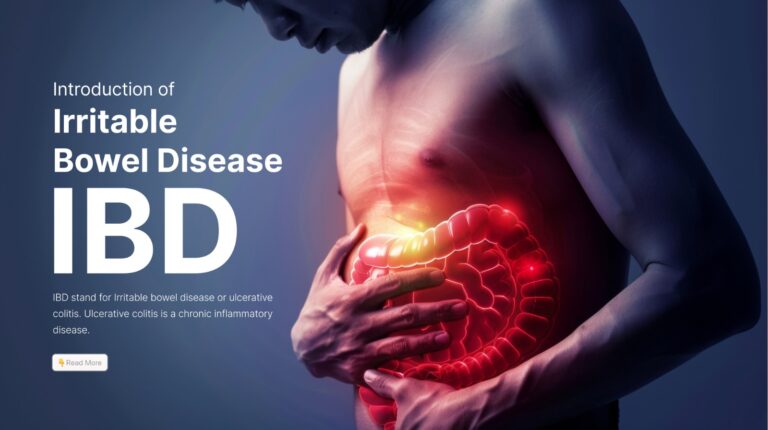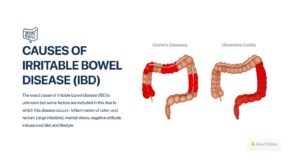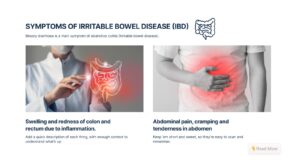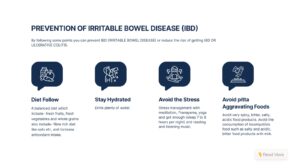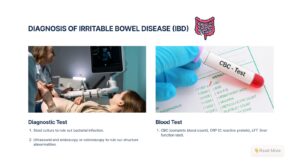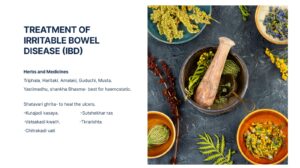INTRODUCTION OF IRRITABLE BOWEL DISEASE (IBD)
IBD stand for Irritable bowel disease or ulcerative colitis. Ulcerative colitis is a chronic inflammatory disease.
Altered bowel habits are found in IBD such as diarrhoea, constipation, bleeding from the rectum, excessive thirst, cramps, tenesmus, abdominal pain, pain in joints of lower limb etc. ulcerative colitis (IBD) affects the large intestine (colon and rectum). Ulcerative colitis is a relapsing-remitting disease, means experiencing a lot of pain and then the pain subsides or is gone, the pain comes in episodes like this.
According to Ayurveda concept ulcerative colitis (IBD) can be correlated with Raktatisara, Raktaja Pravahika, Grahani Roga. Vitiated pitta and rakta are responsible for inflammation and ulceration of large intestine. If a patient suffering from diarrhoea (Pittajatisara) consumes acidic food and drink then acidity (pitta dosha) increases and contaminates the blood, causing diarrhoea with bleeding and symptoms like thirst and pain, burning sensation, fever are found.
IBD (ulcerative colitis) is the result of an abnormal response of immune system of body. Ulcerative colitis is a disease of mucosa that involves the colon and rectum. Due to ulcers and inflammation in the mucosa of intestine, proper absorption of water and electrolytes is not possible due to which the patient passes loose stools and there is a loss of water in the body and he feels weak. frequent tendency to pass liquid stool and blood in stool.
CAUSES OF IRRITABLE BOWEL DISEASE (IBD)
The exact cause of Irritable bowel disease (IBD)is unknown but some factors are included in this due to which this disease occurs- Inflammation of colon and rectum (large intestine), mental stress, negative attitude, imbalanced diet and lifestyle.
According to Ayurveda indigestion of food is a major cause of diarrhoea. Indigestion happens due to the digestive fire being low. Whenever excess indigested food (ama dosha) gets accumulated in the abdomen, then according to natural rules, it is thrown out of the body through vomiting (upward passage) and diarrhoea (download passage).
Excessive consumption of bitter, acidic, salty, spicy food, processed and packaged food. Over consumption of hot liquids and constant exposure to fire, sun rays, heat, hot air. Under the influence of anger and jealousy and Pittaj prakruti of the patient.
Consuming very greasy, very hot, very liquid, very thick substances.
Indigestion, over eating, poisoning, incompatible food, eating unripe food (improperly cooked food).
Consumption of contaminated water, excessive drinking, contaminated alcohol.
Mental reasons like- fear, anger etc and suppression of normal urges.
Panchakarma is not done properly and eating even if the previous meal has not been digested.
Dosa imbalance- pitta cause- inflammation and ulceration.
Vata cause- bowel dryness and spasms.
Kapha cause- stagnation and happiness lead to bowel obstruction.
SYMPTOMS OF IRRITABLE BOWEL DISEASE (IBD)
Bloody diarrhoea is a main symptom of ulcerative colitis (Irritable bowel disease).
Discharge of only mucus (kapha dhatu) from the anus along with scanty stool, stool is released in very little quantity and mucus in large quantity. Tenesmus occurs during defecation, sometimes blood may also come out from the anus along with defecation, even after defecation the patient feels that the stomach has not been completely cleaned and frequent discharge of liquid stool from the anus.
The patient feels thirsty, has stomach ache and experience burning sensation in anus.
Red and black coloured stool comes out from the anus with foul smell, the patient also has symptoms like thirst, burning sensation, fainting, burning sensation in whole body and anal pain (proctalgia) and excessive sweating.
Swelling and redness of colon and rectum due to inflammation.
Abdominal pain, cramping and tenderness in abdomen. Due to Malabsorption of nutrients and water- cause weight loss and weakness.
PREVENTION OF IRRITABLE BOWEL DISEASE (IBD)
By following some points you can prevent IBD (IRRITABLE BOWEL DISEASE) or reduce the risk of getting IBD OR ULCERATIVE COLITIS.
Diet follow a balanced diet which include- fresh fruits, fresh vegetables and whole grains also include- fibre rich diet like oats etc, and increase antioxidant intake.
Maintain healthy lifestyle and daily exercise for 30 to 40 minutes.
Stay hydrated- drink plenty of water.
Avoid the stress- stress management with meditation, Pranayama, yoga and get enough (sleep 7 to 8 hours per night) and reading and listening music.
Avoid pitta aggravating foods- avoid very spicy, bitter, salty, acidic food products. Avoid the consumption of incompatible food such as salty and acidic, bitter food products with milk.
Avoid excessive physical and mental strain because stress can increase symptoms of IBD like- diarrhoea, pain, bloating, discomfort etc. Stress can change the bacterial flora in gut which can increase symptoms of ulcerative colitis.
Pitta balance diet- pitta pacifying diet should be taken to balance pitta such as- consume soft, easily digestible food and avoid the hard food products and spicy food.
Avoid environmental pollutants and toxins.
Get regular Ayurvedic panchakarma treatments because through panchakarma contaminated pitta, vata and kapha doshas are removed from body and the body gets purified. Through purgation contaminated pitta, through vomit contaminated kapha and through vasti (medicated enema) the contaminated vata are removed from the body.
Don’t skip meals – skipping meals has a bad effect on the patient suffering from IBD and affects the gut microbiome which disturbs the balance of good and bad bacteria. When the balance of these bacteria is disturbed, the digestive symptoms get affected and the symptoms of IBD increase. Eat easily digestible food.
Avoid alcohol consumption because alcohol damage the gut barrier and can cause inflammatory response, which may increase the risk of disease. Alcohol can increase the risk of intestinal infection and can make the IBD symptoms worse.
In Ayurveda IBD or ulcerative colitis is correlated with Raktajatisara (bloody diarrhoea). Raktajatisara (IBD) occurring due to imbalance of doshas (mainly vitiated Pitta and Rakta are responsible for ulceration and inflammation of large intestine). By follow these preventive measures, doshas in the body remain balanced and by maintain doshas balance and proper digestion of food, chronic inflammatory disorders like IBD can be avoided.
DIAGNOSIS OF IRRITABLE BOWEL DISEASE (IBD)-
History- Medical history- symptoms (abdominal pain, frequent discharge of liquid stool and bowel habits etc).
-duration of symptoms.
-food habits, motions etc
Physical examination- per abdomen- palpation to check for tenderness.
per rectum check for hemorrhoids, rectal bleeding etc.
Pulse examination (nadi Pariksha), Tongue examination (Jiva Pariksha), Eye examination (Akshi Pariksha), Questionnaire examination.
Diagnostic test- stool culture to rule out bacterial infection.
Ultrasound and endoscopy or colonoscopy to rule out structure abnormalities.
Blood test- CBC (complete blood count), CRP (C reactive protein), LFT (liver function test).
TREATMENT OF IRRITABLE BOWEL DISEASE (IBD)
Firstly manage stress with reading or listening to music, meditation, yoga, pranayama, daily exercise, follow a balance diet and healthy life style and get proper sleep, avoid the triggers such as- anger, frustration, fear, salty, spicy, acidic food products, incompatible food products etc. Avoid the consumption of alcohol and smoking.
According to Ayurveda- detoxification (panchakarma) should be done to remove the toxins (three dosha -vata, pitta, kapha). Virechana (purgation) is the treatment for pitta dosha, Vamana(vomit) for kapha dosha, Vasti (medicated enema) for vata dosha. Once the body is purified through detoxification, treatment to mitigate the doshas should be undertaken.
Herbs and Medicines- Triphala, Haritaki, Amalaki, Guduchi, Musta.
Yastimadhu, shankha Bhasma- best for haemostatic.
Shatavari ghrita- to heal the ulcers.
-Kutajadi kasaya.
-Sutshekhar ras
-Vatsakadi kwath.
-Tkrarishta
-Chitrakadi vati
Piccha vasti- it is sticky or lubricant, due to this property it heals the ulcers.
CONCLUSION
Irritable bowel disease is a chronic inflammatory disease characterised by abdominal pain, cramps, excessive thirst, tenesmus occurs during defecation, discharge of mucous with scanty stool and red or black coloured stool, burning sensation, weakness etc. Caused by imbalance of doshas (Vata, Pitta, Kapha) and indigestion (due to the digestive fire being low). Healthy life style and healthy diet and enough sleep (7 to 8 hours per night) can manage the symptoms of irritable bowel disease. Avoid the trigger can prevent the ulcerative colitis (IBD), if any such symptoms are found in your body then definitely contact your health care professional.



